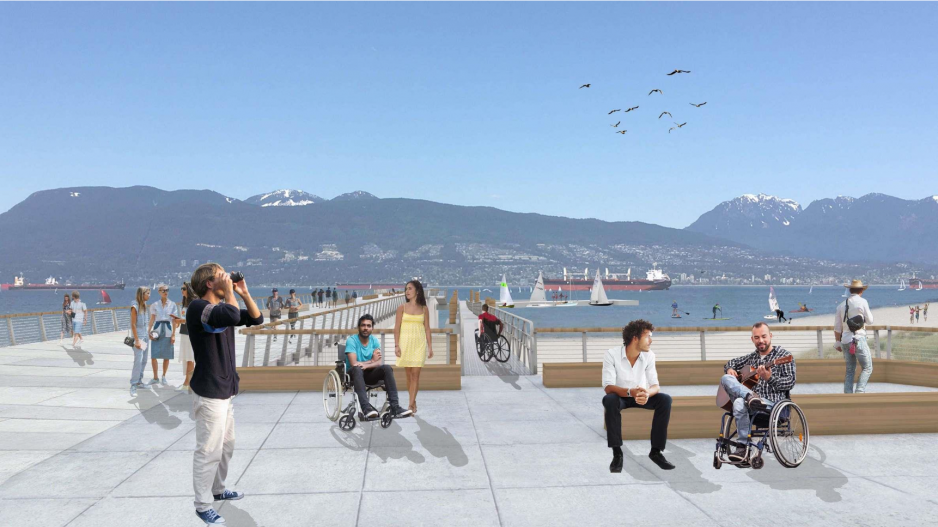What happened since Vancouver Park Board commissioners voted in November 2017 to rebuild the aging Jericho Beach Park Pier?
In no particular order: Two elections, two damaging windstorms, a pandemic and an acceleration of First Nations reconciliation policies.
A staff report to Monday night’s meeting of the ABC supermajority board is an about-face from the concept that the NPA simple majority approved: A $16 million replacement of the 1977-built pier, also known as Discovery Pier.
In November 2021 and January 2022, the pier was battered and bruised by a double-whammy of storms, the latter during a king tide. It has not reopened. Park Board staff estimate the cost of replacement at $21 million to $25 million, due to inflation, cost escalations, contingencies and ancillary costs.
They want to spend up to $3.6 million to get rid of the existing pier and maintain the timber breakwater to protect the Jericho Sailing Centre’s harbour.
Had the six-year-old recommendation been activated on schedule, Vancouver boaters, kayakers, swimmers, fishers, crabbers and selfie-takers could have already enjoyed one, if not two, summers on a new pier.
“The aspirational goal is to begin construction by 2020, starting with demolition of the existing pier and completing the work by 2022,” said the staff report in 2017.
That report said there had been a pier on the site since at least 1942. There was a wharf nearby, at a former air force base transformed into the United Nations Habitat Forum venue in 1976. That wharf, the last major vestige of the UN Conference on Human Settlements, was demolished in 2011.
The new report calls the pier a “colonial structure,” and whatever happens on the site after demolition would involve the Musqueam, Squamish and Tsleil-Waututh, who are planning to build condo towers on the Jericho Lands up the hill.
In 2016, the Park Board had already adopted 11 calls for action from the Truth and Reconciliation Commission’s report. Five years later, Vancouver became the first Canadian municipality to adopt the UN Declaration on the Rights of Indigenous Peoples. Early last year, the Park Board voted to explore co-managing parks with the three First Nations.
The 2017 report said 867 people filled out a questionnaire, with 76 per cent of them supporting replacement. An archaeological overview was conducted, recommending a more thorough assessment take place before any construction.
"Staff will continue to work with the [First] Nations to ensure that the final design adequately addresses their needs and concerns,” it said.
In 2017, staff did not shy away from the pier’s precarious position. The six issues and considerations for the site included the pier’s age, and threats from storm surge and sea level rise and strong wind and wave action.
“King tides and storm surges flood the existing pier and cause damage. These conditions are expected to become more acute with climate change,” the 2017 report said. “The pier is subject to intense storm and wave action. The boats launched at the Jericho Sailing Centre require protection from the wave action.”
The Park Board requested $2 million from the 2016 to 2018 capital plan “as an emerging priority,” and suggested seeking more funds from the 2019 to 2022 version. The Disabled Sailing Association, which since rebranded as the Adaptive Sailing Association of B.C., and the Park Board began a fundraising campaign.
But the new report starkly states: “Sufficient funding for construction of a new pier is not presently available.” Not surprising words, in an expensive city that is struggling (and, in many cases, failing) to provide basic housing and social programs to those in need.
Fundraising after the 2017 vote did not generate any donations or grants, according to the 2023 report. It is unclear how much effort went into the fundraising campaign.
On the first weekend of May in 1978, fire crews saved Discovery Pier from disappearing. A pre-graduation party by a group of high schoolers went awry, causing $43,000 worth of damage. That is more than $200,000 in today’s dollars. It was restored.
Something else happened since November 2017. In December 2018, a heavy storm cut the 1914-built White Rock Pier in half. The community rallied and $4 million in private and public funds were raised to repair Canada’s longest pier. It reopened the following summer.





